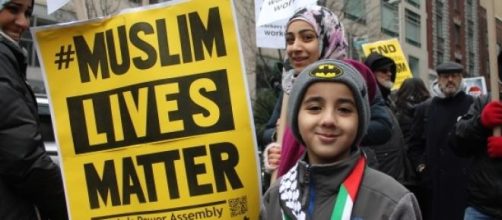The religious groups are getting angry, and fearful. Following the attack on the Paris offices of satirical magazine Charlie Hebdo and Copenhagen shootings a few weeks later, anti-Muslim hate rhetoric has been on the rise.
According to charity Tell MAMA, which records anti-Muslim hate crimes in the UK, children faced a backlash of abuse and bullying in schools. Teachers' unions and anti-racism groups worried after an increase in incidents involving verbal and physical attacks against Muslims, which the Independent reported at the end of January.
In the wake of the attacks, 112 incidents were reported.
Majid Yasin, Imam and director of the Bournemouth Islam Centre and Central Mosque, blames it on the media playing a "dirty game." Three days after the Paris attacks, five men entered his mosque. "They wanted to fight us and gave us some leaflets against Islam, shouted racist abuse, religious abuse," Majid recalls. Although the police was called and the incident recorded on CCTV, local news didn't report on the events. "A crime is a crime. Be his name Mohammed or Steve or Ali, it doesn't matter. Why do we make a connexion between religion and these crimes? This is detrimental for future generations," he says.
Aside from physical and verbal attacks, a major societal change since the 1970's means that straightforward racism is not acceptable in British society anymore.
"Britain has gone a long way to tackle that," says Al-Jazeera's reporter Simon Hooper. However, he says this has morphed into a more subtle form of racism. "With a lot of the far-right narrative to do with Islam there will be a sort of "I'm not racist but' element to it". For the government, these attitudes are harder to tackle as they are less reported.
In an atmosphere of economical concerns throughout Europe, United Against Fascism (UAF) Sabby Dhalu sees a "tendency to blame immigrants that goes hand-in-hand with the austerity measures," which applies to all religions and ethnicities. "This is an attempt to create division and distract attention away from the real issues facing communities", she adds.
Contrary to popular belief, Muslims are the first victims of terrorism. Not only for the biases in the way they are perceived, but in terms of casualties, too. In Paris, another Imam spoke out in the wake of the shootings. Hassen Chalghoumi stated that 95% of victimes of terrorism are Muslims. Arguably, when asked about the issue, most people in the West recall the 9/11 attacks, the 7/7 London bombings, the Charlie Hebdo attacks.
But a US government report commissioned in 2011 showed that "in cases where the religious affiliation of terrorism casualties could be determined, Muslims suffered between 82 and 97% of terrorism-related fatalities over the past five years."

